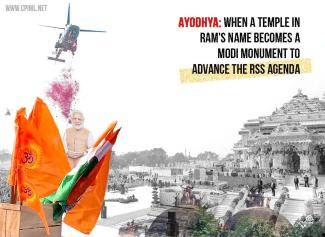India had got a rude shock three decades ago when the historic Babri Masjid was demolished by the Sangh brigade in broad daylight. But despite the violence of this act and the hundreds of lives lost as a result, many Indians continued to view it in terms of a mosque versus temple dispute. Till recently the Supreme Court held the demolition as a crime, an egregious violation of the rule of law, but strangely awarded the perpetrators of the crime the title of the land while a plot was allotted elsewhere in the town for relocation of the mosque. The spectacle now being unleashed around the yet to be completed temple in Ayodhya should however make it clear to one and all what the battle really entailed all along. It was never only about replacing a mosque with a temple, it was about reshaping India according to the RSS vision of Hindu Rashtra.
The signs of the emerging order are becoming crystal clear with every passing day. The inauguration or consecration of the temple has become a massive state event. The amalgamation of religion and governance is now near-complete. While the inauguration of the new parliament building was made into a religious event with priests vesting the PM with the 'Sengol', a monarchical relic from Tamil Nadu, the inauguration of the Ram Mandir in Ayodhya became an out and out state-sponsored political event. To 'prepare' himself for the 'consecration ceremony' of the idol in the new temple, the Prime Minister undertook a grand temple tour across the country, with even members of his security staff wearing traditional religious attire. To top it all, the inauguration was marked by a half-day public holiday in all government offices and establishments, even many hospitals!
Ayodhya is now not just home to yet another temple in the name of Ram, it epitomises the ongoing reshaping of India on the basis of a growing fusion of state power, Hinduism and corporate interests. India's most prominent corporate faces were present in the event along with the entire BJP-RSS leadership and individuals in top constitutional positions. The Prime Minister who earlier used to describe himself as 'prime servant' of the people now routinely calls himself God's chosen representative even as his bhakts have started projecting him as an incarnation or avatar of God. The idea of modern India as a secular democratic republic is fast being obliterated with the republic virtually metamorphosing into a corporate-backed monarchy packaged as a divinely ordained order.
The temple is not yet fully ready (a reason why the Shankaracharyas are calling the consecration scripturally flawed), but the entire town has become a centre of massive construction and beautification activities coupled with large-scale eviction of people and demolition of houses, shops and even places of worship. Three main roads have been renamed Ram Path, Bhakti Path and Ram Janmabhoomi Path and are being widened and beautified reportedly at a staggering cost of 30,000 crore rupees. The construction of Ram Path has reportedly entailed the destruction of a whopping 2,200 shops, 800 houses, 30 temples, 9 mosques and 6 tombs. The drive for developing Ayodhya as a world-class tourist destination has also meant the arrival of the Adani group, the rise of a lucrative land market at the cost of local farmers and farming, and environmentally hazardous construction in the eco-sensitive zone on the bank of river Saryu.
The coalescence of religion, state power and big business is also taking religion away from the private domain of individuals into the vortex of big business and big spectacle. The corridors being built in Varanasi, Mathura and now Ayodhya have led to extensive demolition of old buildings, shops and even small temples. Like corporate takeover of small farming and small trade, a similar phenomenon of centralisation and concentration is being witnessed in the arena of religion too. And the politicisation of Ram, especially in the context of the impending Lok Sabha elections, has even blurred the distinction between a Ram Mandir and a Modi monument. Huge cutouts of Modi in Ayodhya have overshadowed even Ram. Promotion of the personality cult of the supreme leader is exploiting many common people's devotion to Ram to the hilt.
Desperate to hold on to power in the coming elections after ten years of communal hatemongering and deceitful populism, the Modi government seeks to use the Ram Mandir in Ayodhya as an electoral trump card. It is also the most explicit symbol of the Sangh brigade's Hindu supremacist vision of India to the outside world. The Ramayana is undoubtedly one of the most popular epics, but true to India's cultural diversity the Ramayana too has several versions and diverse interpretations. Any attempt to bulldoze India's diverse identity to impose a majoritarian uniformity - whether in matters of religion, language, cuisine or any other sphere of culture - can only prove disastrous for the very existence of India as a united country. A secular and diverse democracy can be the only vibrant mode of existence for the world's most populous and diverse country.
Incidentally, the intervening night of 22/23 January 2024 also marks the twenty-fifth anniversary of the horrific lynching of the Australian missionary Graham Staines and his sons Philip (aged 10) and Timothy (aged 6) by a mob instigated by Bajrang Dal leader Dara Singh. The Sangh brigade which uses the "Jai Shri Ram" chant to express allegiance to Ram also invokes it as a battlecry to perpetrate and celebrate acts of brutal communal violence. It is common to see the Sangh brigade defend and celebrate perpetrators of such terror even after they are convicted. For the Sangh brigade which celebrates December 6 as a "day of valour", January 22 would virtually become its new "Republic Day". We the people of India whose predecessors had adopted the Constitution to proclaim India as a secular democratic republic will have to fight harder than ever to defend the Constitution and the Republic against the fascists’ vicious agenda.










